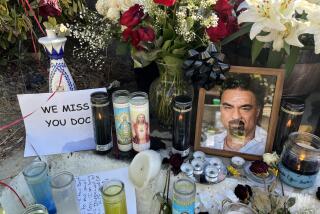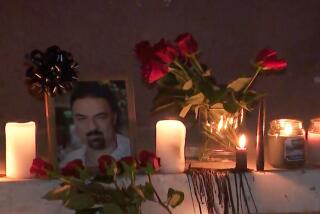Doctor’s Murder Brings Fear to Border City
- Share via
McALLEN, Texas — One of the largest gun stores in this border city is welcoming new customers--doctors. They are stocking up on firepower not for hunting or target practice, but for self-protection.
In October, one of their own was gunned down in what some say was a retaliatory killing by the Mexican family of a woman who died after childbirth and whose husband is rumored to be a drug-trafficker.
Despite police efforts to assure them that the homicide is an isolated case, many doctors are afraid that their efforts to save lives, especially those of people tangled in the drug trade, could cost them their own.
“It may incite other people to do the same. You know, if you don’t like your doctor, kill him,” said Dr. Miguel Cintron, a Harlingen gynecologist and a friend of the slain doctor.
Police say they have no suspects in the Oct. 25 killing of Dr. Francisco Jusino, but colleagues and friends are steadfast in their belief that he was the victim of a hit put out by a grieving and dangerous family.
Jusino, 33, an up-and-coming obstetrician with a wife and two children and described by friends as passionate about his work, was gunned down in the parking lot of a McAllen apartment complex. Police said he was shot repeatedly as he opened the door of his sport utility vehicle.
Although the shooting occurred at 6 p.m., well before dark, and near a busy intersection, no witnesses have come forward.
Jusino was slain just weeks after being threatened by relatives of a patient who suffered massive internal bleeding that led to multiple organ failure. She died Sept. 15, several days after giving birth to a son, now reportedly in the care of his maternal grandmother.
Many people willing to be interviewed for this story refused to be identified by name, unnerved by the circumstances of the doctor’s death.
One source, a friend of the doctor, says that the woman’s family is from Guadalajara and that her husband--a U.S. citizen--is wanted in this country on drug-trafficking charges. Authorities, including the FBI and local police, refused to comment on the allegations.
When the hospital ordered an autopsy, the woman’s father refused, saying he already knew who killed his daughter, according to a doctor who asked to be anonymous.
Ricardo Garcia, a McAllen lawyer and a friend of Jusino, said Jusino told him of a chilling threat the patient’s father made just after she died: “He told him, ‘You’re going to feel in your flesh what we feel in our heart.’ ”
Jusino was scared, Garcia said. Within days, Jusino thought he was being followed and reported his suspicions to the police and an FBI acquaintance. He was dead soon after.
Garcia said he had little doubt about who shot his friend.
“A problem arose, he was threatened, and he’s been killed. I don’t know of anything else that could have led to it,” he said. “My suspicion and my belief is that it was related to that problem.”
Police, who refused an open records request for reports on Jusino’s slaying and any prior harassment, say they have followed all leads, including investigating the patient’s family.
“There’s nothing to prove that these individuals are involved right now,” said Officer Mitch Reinitz. “There’s a lot of speculation surrounding the case, but we cannot act on speculation. You have to go on facts. The facts are, we have someone who was shot several times, and we don’t know who did it.”
The killing has shaken many of the almost 400 doctors who practice in Hidalgo and Starr counties.
At the Armory Sport Shop in McAllen, three doctors bought handguns the day after Jusino’s death, said store manager Andy Mendoza. Six more have bought guns since. That one-month total compares to a normal tally of about two doctors a year, he said.
One group of physicians pitched in for private lessons to become licensed to carry concealed handguns.
Police say they have no reason to suspect that Jusino’s killing foreshadows a widespread threat to the medical community.
Doctors disagree. They contend that the threat is inherent with working along the Texas border and the likelihood of treating patients somehow connected to the drug trade.
About 65% of all the cocaine that enters the United States flows across the Rio Grande into Texas, according to the federal Drug Enforcement Administration. The illicit business has invaded many aspects of everyday life.
“We see a lot of people who carry beepers and wear a lot of gold around their necks and pay in cash, so we suspect,” said Dr. Carlos De Juana, a urologist who has practiced in McAllen 16 years.
“The fear is that we all are exposed to dealing with these types of people, and we don’t know how to behave with them,” he said. “Medicine is not an exact science; people are going to continue to die. People feel if something goes wrong, it has to be the fault of somebody, and we fear somebody could do this again.”
More to Read
Sign up for Essential California
The most important California stories and recommendations in your inbox every morning.
You may occasionally receive promotional content from the Los Angeles Times.













